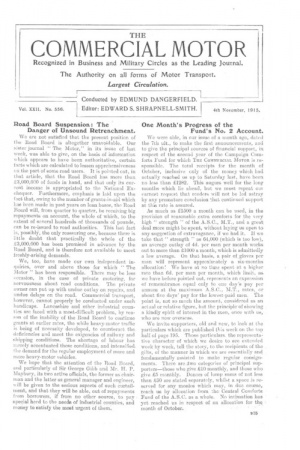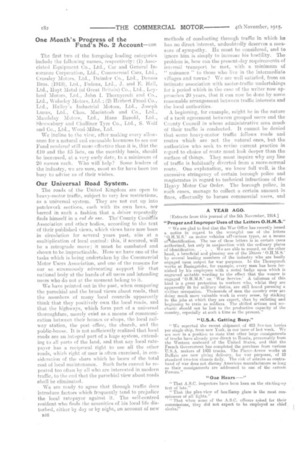Road Board Suspension: The Danger of Unsound Retrenchment.
Page 1

Page 2

If you've noticed an error in this article please click here to report it so we can fix it.
We are not satisfied that the present position of the Road Board is altogether unavoidable. Our sister journal " The Motor," in its issue of last week, was able to give, on the basis of information which appears to have been authoritative, certain facts which are calculated to lessen apprehensiveness on the part of some road users. It is pointed out, in that article, that the Road Board has more than A.:3,000,000 of funds in hand, and that only its current income is appropriated to the National Exchequer. Furthermore, emphasis is laid upon the fact that, owing to the number of grants-in-aid which has been made in past years on loan bases, the Road Board will, from quarter to quarter, be receiving big repayments on account, the whole of which, to the extent of several hundreds of thousands of pounds, can be re-issued to road authorities. This last fact is, possiblY, the only reassuring one, because there is little doubt that practically the whole of the 1:3,000,000 has been promised in advance by the Road Board, and is therefore not available to meet freshly-arising demands.
We, too, have made our own independent inquiries, over and above those for which " The Motor " has been responsible. There may be less occasion, in the case of private motoring, for nervousness about road conditions. The private owner can put up with undue outlay on repairs, and undue delays on the road. Commercial transport, however, cannot properly be .conducted .under such handicaps. Lancashire and other industrial counties are faced with a most-difficult problem, by reason of the inability of the Road Board to continue grants at earlier rates, the while heavy-motor traffic is being of necessity developed, to counteract the. deficiencies and meet the exigencies of railway and shipping conditions. The shortage of labour has merely accentuated those conditions, and intensified, the demand for the regular employment of more and more heavy-motor vehieles.
We hope that the attention of the Road Board, and particularly of Sir George Gibb and Mr. H. P. Maybury, its two active officials, the former as chairman and the latter as general manager and engineer, will be given to the serious aspects of such curtailnient, and that -they will be able, out of repayments from . borrowers, if from no other source, to pay special heed. to the needs of industrial counties, and money to Satisfy the most urgent of them., One Month's Progress of the
Fund's No. 2 Account.
We were able, in our issue of a month ago, dated the 7th ult., to make the first announcements, and to give the principal sources of financial support, in respect of the second year of the Campaign Comforts Fund for which THE COMMERCIAL MOTOR is responsible. The total receipts for the month of October, inclusive only of the money which had actually reached us up to Saturday last, have been no less than .1282. This augurs well for the long monthswhich lie ahead, but we must repeat ow earnest request that readers will not be led astray by any premature conclusion that continued support at this rate is assured. • . As much as £1500 a month can be used, in the provision of reasonable ,extra comforts for the very high " strength " of the A.S.C., MT.,, and a great. deal more might be spent, without laying us open to any suggestion of extravagance, if we hart. If we take that " strength " as 64,000 (which is too low), an average outlay of 4d. per man -per month works out to more than £1000 a month, which is admittedly a low average. On .thate basis, a pair of gloves per man will represent approximately a six-months allocation! We have at no time spent at a higher rate than 6d. per man per month, which limit, as we have before pointed out, represents an expression of remembrance equal only to one days .",pay per annum at the maximum A.S.C., MT., rates, or about five days' pay for the lowest-paid men. The point is, not so much the amount, considered as an actual or relative figure, bet the principle ofshowing a kindly spirit of interest in the men, once with us, who are now overseas.
We invite supporters, old and new, to look at the particulars which are published this week on the top half of page 195. Those particulars, the representative 'character of which we desire to see extended week by week, -tell the story, to the recipients of the gifts, of the manner in which we are essentially and fundamentally assisted to , make regular consign. ments. There are ,,,two categories of principal sup.. porters—those who give 110 monthly, and those who give monthly. Donors of lump sums of not less than ,C50 are stated separately, whilst a space is reserved for any monies which may, in due course, reach us bY allocationfrom the Central Comforts Fund of the A.S.G. as a whole. No intimation has yet reached us in respect of an allocation for the, mOnth of October..
One Month's Progress of the Fund's No. 2 Account—con
The first two of the foregoing leading categories include the following names, respectively: (1) Associated Equipment Co., Ltd., Car and General Insurance Corporation, Ltd., Commercial Cars, Ltd., Crossley Motors, Ltd., Daimler Co., Ltd., Dennis Bros. (1913), Ltd., Fader's, Ltd., J. and E. Hall, Ltd., Hoyt Metal (of Great Britain) Co., Ltd., Leyland Motors, Ltd., John I. Thornycroit and Co., Ltd., Wolseley Motors, Ltd. ;. (2) Herbert "'rood Co., Ltd., Halley's Industrial Motors, Ltd., Jose-ph Lucas, Ltd., Chas. Macintosh and Co., Ltd„ Maudslay Motors, Ltd., Mans Benold, Ltd., Shrewsbury and Challiner Tyre Co.,-Ltd., -S, Wolf and Co., Ltd., Wood-Milne, Ltd..
We incline to the view, after making every allowance fer a natural and excusable keenness to see our Fund rendered still moue effective than it is, that the kW and the 15 lists, on the monthly basis, should be increased, at a very early date, to a minimum of 20 names each. Who will help? Some leaders of the industry, we are sure, must so far have-been too busy to advise us of their wishes.
Our Universal Road System.
The roads of the United Kingdom are open to heavy-motor traffic, subject to very few restrictions, Os a universal system. They are not cut up into patchwork sections, each with its own laws, nor barred in such a fashion that a driver repeatedly finds himself in a. cut de sac. The' County Countfils Association arid other bodies, according to the text of their published views, which views have now been in circulation for several years past, aiin at a multiplication of local control: this, if secured, will be a retrograde move ; it must be combated and Shown to be, impracticable. Here we have one of the tasks which is being undertaken by the Commercial Motor Users Association, and one of the reasons for our so strenuously advocating support Mr that. national body at the hands of all users and intending users who do not at the moment belong to it.
• We have pointed out in the past, when comparing the parochial and the broad views about roads, that the members of many local councils apparently think that they positively own the local roads, and that the highways, which form part of auniversal thoroughfare, merely exist as a means of communication between their houses or shops, the local railWay station, the post office, the church, and the public-house. It is not sufficiently realized that local roads are an integral part of a huge system, extending to all parts of the land, and that any local ratepayer has a reciprocal right to use all the other roads, which right of user is often exercised, in consideration of the share which he bears of the total cost of local maintenance. Such facts cannot be repeated too often by all who are interested in modern traffic, to the end that the parochial view about roads shall be eliminated.
• We are ready to agree that through traffic does introduce factors which frequently tend to prejudice the local ratepayer against it. The self-centred resident who finds the amenities of his local life disturbed, either by day or by night, on account of new E16 methods of conducting through traffic in which he has no direct interest, undoubtedly deserves a measure of sympathy. He must be considered, and to ignore him is simply to increase. his hostility. The problem is, how can the present-day requirements of internal transport be met, with a minimum of " nuisance " to those who live in the intermediate villages and towns? We are well satisfied, from an intimate association with motor-traffic undertakings for a period which in the case of the writer now approaches 20 years, that it can now be done by some reasonable arrangement between traffic interests and the local authorities.
A beginning, for example, might be in-the nature of a tacit agreement between grouped users and the County Council in whose administrative area much of their traffic is conducted. It cannot be denied that some heavy-motor traffic follows roads and routes which are not the natural ones, but the authorities who seek to revise current practice in regard to choice of route must look deeper than the surface of things. They must inquire why any line of traffic is habitually diverted from a more-normal route: One explanation, we know full well, is the excessive stringency of certain borough police and magistrates in regard to technical infractions of the Heavy Motor Car Order. The borough police, in such eases, manage to collect a certain amount in fines, effectually to harass commercial users, and




















